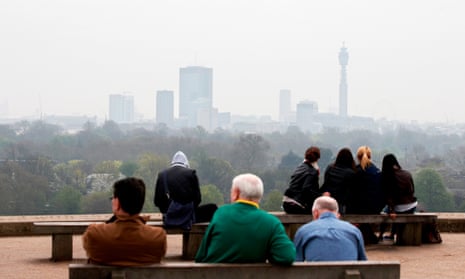Air pollution may increase the chance of developing dementia, a study has suggested, in fresh evidence that the health of people of all ages is at risk from breathing dirty air.
People over 50 in areas with the highest levels of nitrogen oxide in the air showed a 40% greater risk of developing dementia than those with the least NOx pollution, according to the research, based on data from London.
The observational study, published in the BMJ Open journal on Wednesday, cannot establish that air pollution was a direct cause of the dementia cases. However, the authors said the link between higher pollution and higher levels of dementia diagnosis could not be explained by other factors known to raise risks of the disease.
Air pollution has already been linked with cardiovascular and respiratory disease, but this is one of the first studies to examine links with neurodegenerative illness. Frank Kelly, professor of environmental health at King’s College London and one of the authors of the paper, told the Guardian: “The study outcome suggests a linkage [between air pollution and dementia] but cannot inform on the cause. However, I believe that we now have sufficient knowledge to add air pollution to the list of risk factors for dementia. Our calculations suggest that it elevates risk by 7%, so [that would suggest] approximately 60,000 of the total 850,000 dementia cases in the UK, in mathematical terms.”
The new findings add to a growing body of recent research on the wide-ranging effects of air pollution. Earlier this week, Unicef warned of the risk to children from the “toxic” school run, while evidence that particles of pollutants can cross into placentas has just been published.
A ground-breaking study from China recently found a “huge” reduction in intelligence associated with breathing dirty air, equivalent to losing a year’s education.
The Kings College London study adds to previous research suggesting a link with dementia, but scientists warned that the results must be taken cautiously because the observational study could not closely track other possible causes such as lifestyle factors or the relative economic deprivation of the patients studied, or the amount of air pollution each was subject to individually.
The study used estimates of air and noise pollution levels across London and correlated these with anonymised patient health records for 131,000 patients aged between 50 and 79 at 75 GP practices within the M25. Their health was tracked for seven years from 2005, during which period 1.7% of the patients were diagnosed with dementia. Their exposure to air pollution was estimated based on their home postcodes.
Martie Van Tongeren, a professor of occupational and environmental health at Manchester University, who was not involved, said: “There is a growing body of evidence of the link between air pollution and brain health, including dementia and Alzheimer’s. This study adds to this body of evidence and fits with some of the previous studies. As most people in the UK live in urban areas, exposure to traffic-related and other air pollutants is ubiquitous. Hence, even a relatively small increase in risk will result in a large public health impact.”
The paper’s authors said a link between poor air quality and dementia could begin early in life. They wrote: “Traffic related air pollution has been [linked to] poorer cognitive development in young children, and continued significant exposure may produce neuroinflammation and altered brain innate immune responses in early adulthood.”
Campaigners called on the government to take urgent action on air pollution. Simon Alcock, head of UK public affairs for ClientEarth, which has repeatedly taken the government to court over its failures on air quality, called for a national clean air bill backed by an independent watchdog, and clean air zones in the most polluted areas. He said: “Air pollution is damaging our health from the womb to old age. It is unacceptable in 2018 for people to be risking dementia just by breathing.”
Road traffic should be the focus of efforts to clean up our air, as it is the leading cause of the health problems, added Aaron Kiely, air pollution campaigner at Friends of the Earth. “Efforts to clean up our cars, vans and lorries must be put in the fast lane – we can’t afford to wait until 2040 for most new vehicles to be zero-emission,” he said. “Greater investment is also needed in alternatives to motor vehicles, such as safer cycling infrastructure, and affordable and convenient public transport.”
A Defra spokesperson said levels of air pollution, including NOx, had fallen and the government was taking further action: “By ending the sale of conventional new diesel and petrol cars and vans by 2040, we are acting faster to tackle air pollution than almost every other major developed economy.”
Labour slammed ministers for failing to address air pollution, which regularly exceeds legal limits in many areas, particularly in London. Sue Hayman, shadow environment secretary, said: “It is simply not good enough for Michael Gove to shunt this problem on to cash-strapped local councils, publish strategies on wood burners and drag his feet on new legislation. [We] would bring forward a new Clean Air Act and a network of clean air zones to tackle the UK’s illegal levels of air pollution in the quickest time possible.”
